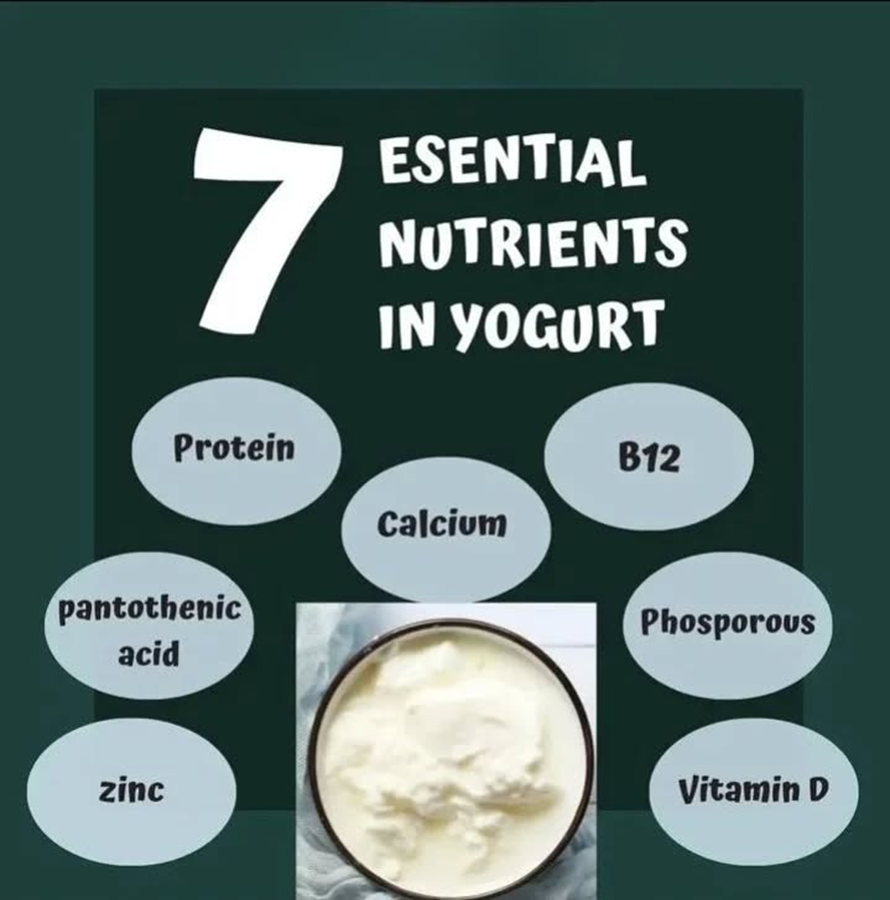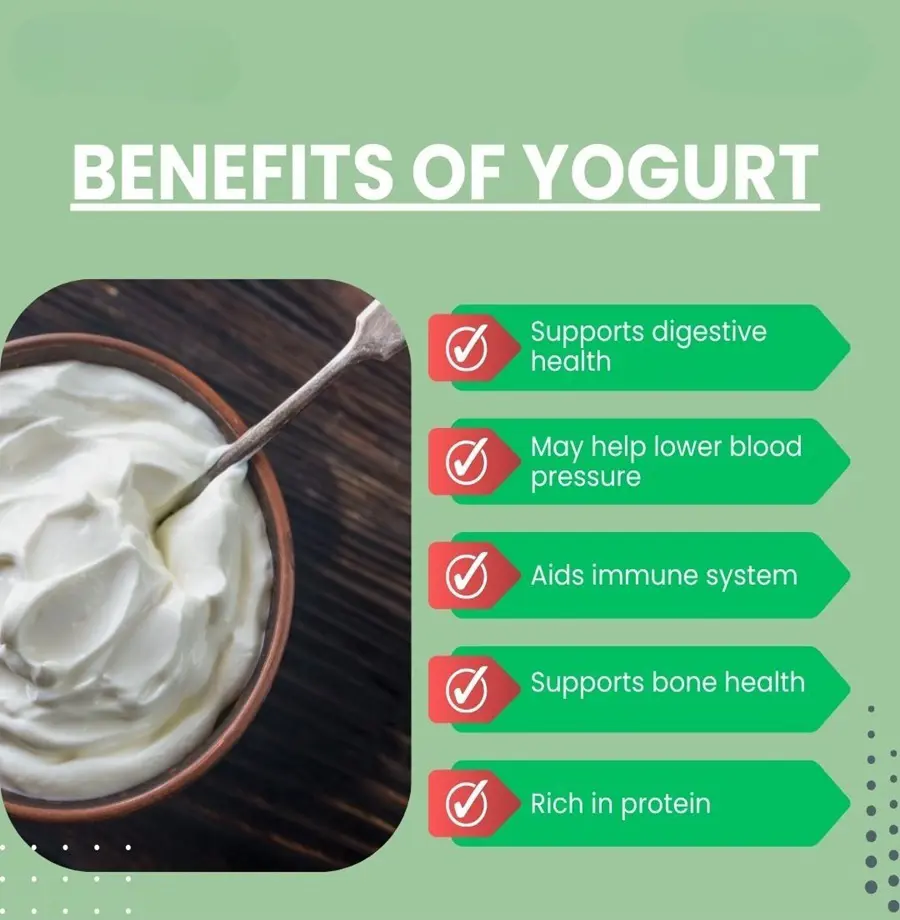Is Yogurt Good For You?

This post may contain affiliate links. If you make a purchase through links on our site, we may earn a commission.
Yogurt is a dairy product, a nutrient-packed food. It is often hailed as a health food and there are good reasons for this. If we look into the nutrients present in yogurt; it has numerous of them essential for functioning of our body.
In this article, we'll look into the nutrients we get by consuming yogurt and the health benefits linked to them. Moreover, we will also have a look at specific groups of people for whom yogurt is not suitable, as these groups may not be well adapted to dairy products.
What Is Yogurt?

Yogurt is a dairy product, obtained by fermenting milk with bacteria cultures. The bacteria used converts the lactose present in the sugar to lactic acid, relying on the fermentation process.
The acids thus formed give yogurt its characteristic tangy taste. Not only flavor but fermentation also affects the texture of yogurt, which is thicker than milk.
Common Bacteria Used In Fermenting Yogurt
There are many bacteria that can ferment milk into yogurt. Among them, the ones that are particularly cultured for commercial production of yogurt include:
Lactobacillus bulgaricus: It is one of the two primary strains of bacteria that is used in the commercial industries for yogurt production. The specialty of this strain is that it's native to milk environments, and can naturally ferment milk lactose in an efficient manner.
Streptococcus thermophilus: After the Lactobacillus bulgaricus strain, Streptococcus thermophilus is the second most common bacterial stain used in yogurt production.
This strain however is not used singly, it is often paired with the Lactobacillus strain and the whole combination is used to ferment milk. This bacteria doesn't have the main role in fermenting lactose, rather, it helps in getting the acidic environment, the condition in which the Lactobacillus bulgaricus strain can function effectively.
The Final Nutritional Content After Fermentation
The nutritional content of yogurt is typically the same as milk that was used in yogurt-making. Let's have a look at what a 100-gram of plain, nonfat yogurt contains:
- About 59 calories
- About 81 to 88 grams of water
- About 10 grams of protein
- About 0.4 grams of total fat
- About 3.6 grams of carbohydrates
- Sodium: 36mg, Potassium: 141 mg, Calcium: 110mg, Magnesium: 11mg
- Vitamin B6: 0.1 mg, vitamin B12: 0.8 mcg
A Detailed Look On Yogurt Nutrients

The essential nutrients present in yogurt make it a highly beneficial food. From being a perfect gut-friendly food to a rich source of calcium and protein, yogurt can make a nutritious addition to your diet with the following key benefits.
Probiotic Content
While making yogurt, microbes; tiny organisms are added to it, this is one of the major reasons for yogurt being considered a great healthy food. These live microorganisms added externally are known to be best for digestive health.
The bacteria like Lactobacillus when they reach our gut, can help maintain a healthy balance of gut bacteria which is important not only for healthy digestion but also to alleviate digestive issues one is suffering from.
So, if you are someone who constantly faces bloating, constipation and diarrhea, including yogurt in your diet can be the best solution to get back to a healthy gut by supporting the gut flora.
The benefit of the healthy balance of gut flora is not just limited to gut health, as per studies, good gut health also means a better-functioning brain. Hence, supporting gut health by consuming yogurt also indirectly has a positive effect on mental health.
Protein
Protein is the major macronutrient present in yogurt. The protein content is mainly due to the presence of casein and whey, which are slowly absorbed by the body.
Because of being protein-rich, regularly consuming yogurt can help in maintaining muscle mass. Not only that, making yogurt daily part of our diet can keep us satiated, as a result of which overeating gets prevented.
Calcium
A serving of yogurt has around 100 mg of calcium, this value is a significant percentage of what we need on a daily basis.
This value is important in covering the calcium needs of our body, important for getting stronger bones and teeth.
Vitamins and Minerals
Vitamin B2, Vitamin B12 and vitamin B5 are major vitamins while zinc, phosphorus, selenium, and iodine are the minerals abundantly found in yogurt.
Yogurt Benefits

Yogurt and Immune System
There are bioactive compounds present in yogurt, formed during fermentation. Vitamins and minerals, particularly B vitamins, present in yogurt are also important in keeping our immune system vital.
Yogurt and Weight Loss
Yogurt is fulfilling and low in carbs and calories. This directly signals that it is a companion for people in their weight loss journey.
As per the studies, 100 grams of yogurt containing probiotics when consumed on a daily basis benefits in losing some pounds. Moreover, for the desired result, it's best to choose full-fat yogurt. This is because when the yogurt contains fat, it helps us to stay full for even longer helping us to better appetite control throughout the day.
Yogurt and Diabetes
Unsweetened yogurt is a perfect food for diabetics. Any plain yogurt has a minimum amount of sugar, conversely, it is rich in protein. This content won't cause random blood glucose spikes in diabetics, keeping them away from any undesired health complications.
Greek yogurt can also easily fit into the nutrition plan of the diabetics.
Yogurt Types
Let's have a look at the different types of yogurt available in the market:
- Traditional Yogurt
- Greek-style Yogurt
- Plant-based Yogurt
- Fortified Yogurt; such as the one containing vitamin D and fibers
These yogurts come in many forms; with different fat levels, protein levels, and added flavors.
Sweetened Vs Unsweetened Yogurt
Yogurt comes in many varieties, and the common ones you can encounter in stores are sweetened and unsweetened ones. Sweetened yogurt has the same level of nutrition as the unsweetened ones, but, the sugar content in them is what makes their consumption debated.
Now, looking at the data on sugar content, it has been found that sweetened yogurt are packed with sugars, containing more than 10 grams or more of sugar per serving. Although this addition makes the yogurt sweeter, preferred by most people, the high-calorie content might make you take your steps backward.
Overall, for anyone who is mindful about sugar consumption, especially people who want to reduce their calorie intake, or are suffering from conditions like diabetes, it's better for them to switch to unsweetened yogurt, which would be a healthy choice for them.
How To Choose The Healthiest Yogurt

The different varieties of yogurt available in the market can make choosing the healthiest yogurt can be a bit overwhelming. To decide on the best one, some factors must be considered of which the important ones are listed below:
Look at the fat content and calories
Low-fat or non-fat yogurt is a great choice for the ones whose focus is on the calorie count. As the full-fat counterparts have more calories, low-fat yogurts without the excess fat make them an appealing choice for those on a weight loss journey.
Check the ingredient list
Not all yogurts can be guaranteed to be healthy, as they are not made equal. So, as a consumer, read the ingredients that your choice of yogurt has and avoid the ones that contain ingredients not good for your health. Here are some added ingredients that are unnecessary and best if avoided:
- Sugar
- Fructose/ Corn starch
- Carob bean gum (a thickening agent)
- Lactic acid
- Sodium citrate (a chemical preservative)
Ones High In Probiotics
The bacteria that convert milk to yogurt are present in live form in yogurts featured with "Live and Active" seal. This seal from the National Yogurt Association indicates that the yogurt contains live cultures, which is crucial for getting all the health benefits yogurt has to offer.
Contrary to the yogurt that contains live and active cultures, the ones that go through heat treatment processes like pasteurization may no longer have active or alive probiotics. If you purchase such yogurt then the health benefits, the ones related to the gut, are substantially reduced. Hence, to choose a healthy yogurt, always choose the ones that have been carefully cultured and packaged preserving the integrity of the live cultures.
Best yogurts to choose:
Here are some choices of yogurts that only have benefits to offer:
Plain, Unsweetened Yogurt
As flavored yogurt has more calories, due to the added sugars and artificial sweeteners loaded in it, it's always best to choose plain, unsweetened yogurt.
When one consumes the flavored varieties regularly, they are more prone to weight gain and the complexities that follow. So, to prevent sudden sugar spikes and to keep oneself safe from chronic conditions like diabetes, don't go for the flavored/ sweetened ones. Rather, if you are someone who has a sweet tooth, bring home the plain one and then add any natural sweeter to it before serving.
Greek Yogurt Is The Best Option
The regular yogurt is healthy, but the Greek yogurt is more famed for its nutrition. As Greek yogurt has more protein and is thick due to the removal of the whey during the production, it is more flavorful and has more benefits.
Being more in protein, Greek yogurt can keep you full for a long time and does not have added ingredients in it.
How To Use Yogurt As A Healthier Replacement
Besides using yogurt in your regular meals, you can also swap it for unhealthy foods you consume on a daily basis. Check out the list of foods below for which yogurt can overtake:
- Sour cream: Use yogurt as a dip or in tacos instead of sour cream. The creaminess of yogurt is similar, and what's benefitting is the low-fat content of yogurt.
- Mayonnaise: Low-calorie yogurt can replace mayonnaise in recipes for salads, sandwiches and dressings.
- Creamy Dressing Base: If you are using creamy dressings as a base for salads, then it's important to be aware of the sugar and unhealthy fats present in them. For healthy and mindful eating, use yogurt as a salad dressing base instead.
For Whom Is Yogurt Unsuitable?

Yogurt is a healthy food, but not always. This beneficial food may not be suitable for people who have specific conditions as listed below:
Yogurt Isn't For Lactose Intolerants
The groups of people who can't tolerate lactose from dairy; lactose intolerants, should stay away from yogurt. As yogurt is made from milk, the ultimate lactose source, it contains a notable part of this simple carbohydrate.
The absence of an enzyme that is specific to lactose digestion is absent in these individuals. So, rather than purchasing a normal yogurt, dairy-based one, it would be more suitable for their body if they choose to consume plant-based yogurts or the ones that have the tag "lactose-free".
Not For The Ones With Weakened Immunity
The presence of live bacteria in yogurt can create problems if your immune system is weak. Caution is important in this case as the addition of external bacteria from food sources can cause infections because of the weaker immune system.
However, instead of the unpasteurized ones, people with weak immunity can still enjoy heat-treated yogurts, which don't have live or active bacteria in them. A safely pasteurized yogurt has a low risk of contamination and reduces the chance of foodborne illnesses.
Should Be Avoided By People With Milk Allergies
The proteins present in milk, such as casein, are intolerable to the systems of certain people. These people are the ones who suffer the most from dairy products, the symptoms that show up once they consume dairy include rashes, hives and stomach upset. These symptoms, however, are on the mild side. If not treated on time, life-threatening consequences can occur.
Therefore, individuals with a milk allergy should totally avoid yogurt. Though the milk ferments, the dairy product still has proteins intact in it, so it isn't suitable for sensitive people. An alternative for them does exist, there is free yogurt available in the market which is prepared using plant sources.
Bottom Line
Yogurt is a highly nutritious food packed with benefits like improved digestion. Different benefits yogurt has to offer can be obtained fully if one chooses the right yogurt, particularly the ones that aren't sweetened, have active cultures and have no traces of artificial ingredients in them.
However, yogurt isn't suitable for everyone. Those with conditions like lactose intolerance and milk allergies should completely avoid dairy-based yogurt. Saying that, these people can still rejoice in non-dairy alternatives like almond or coconut yogurt. For people with weakened immunity, it's best for them to get the safe one, particularly pasteurized versions. Overall, if it aligns with your dietary needs and preferences, yogurt can be a delicious and beneficial addition to your diet.
Recent posts
Lifestyle
Lifestyle
How To Eat A Star Fruit
Star fruit is a tropical fruit known for its unique star-like appearance. The fruit can be enjoyed simply, on its own or by adding it on recipes where its extra burst of color and sweet-tart taste can blend well with other ingredients. Whichever way ...
Lifestyle
Is Vegan Diet Actually Healthy?
A vegan diet is considered healthy but not most of the time. As all vegan foods have many beneficial nutrients, they also lack some which often sparks the debate. Without animal products, a vegan diet can be believed to have significant health benefi...
Lifestyle
How To Eat Crawfish The Right Way
A crawfish is a small crustacean that resembles a tiny lobster. Though small in size, this freshwater creature is equally delicious as any other seafood, they are tender, sweet and a little salty. Enjoying crawfish may seem challenging as they are ti...
Lifestyle
Expert Ways To Eat Poppy Seeds
Poppy seeds are small yet powerful because of their nutty taste and crunchy texture. Mild and gentle addition to any dish, they are a staple ingredient in cuisines around the world; you can find them in curries in India and in baked goods in Europe. ...
Lifestyle
How To Stop Snoring: 15 Home Remedies To Get Rid Of
A huge part of population have to lose sleep just because of snoring. If we look at the data from the studies, it has been reported that around two thirds to half of the population are affected by this common issue. What makes this problem more conce...
Lifestyle
Is Sourdough Bread Really Healthy?
Sourdough bread is not just another bread; it's a time-honored and naturally fermented food. With the use of all-natural ingredients, even the yeast, the bread has a unique flavor and texture to offer. Chewy, crusty and sour, sourdough bread is appre...





